(完整word版)Unit2Howoftendoyouexercise知识点归纳与练习.doc
Unit2 How often do you exercise知识点 人教版八年级英语上册
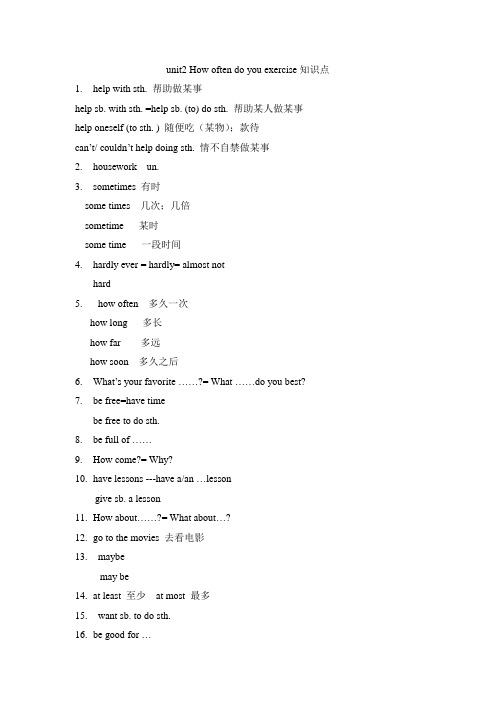
unit2 How often do you exercise知识点1.help with sth. 帮助做某事help sb. with sth. =help sb. (to) do sth. 帮助某人做某事help oneself (to sth. ) 随便吃(某物);款待can’t/ couldn’t help doing sth. 情不自禁做某事2.housework un.3.sometimes 有时some times 几次;几倍sometime 某时some time 一段时间4.hardly ever = hardly= almost nothard5.how often 多久一次how long 多长how far 多远how soon 多久之后6.What’s your favorite ……?= What ……do you best?7.be free=have timebe free to do sth.8.be full of ……9.How come?= Why?10.have lessons ---have a/an …lessongive sb. a lesson11.How about……?= What about…?12.go to the movies 去看电影13.maybemay be14.at least 至少at most 最多15.want sb. to do sth.16.be good for …be good at ……be good with ……17.keep/stay/be healty=keep in good health18.How many…. How much …..19.ask sb. about sth. 问某人关于某事的情况ask for 要;要求;请求ask for a leave 请假20.find that 从句find +宾语+名词find+宾语+现在分词21.基数词+percent---根据它所修饰的名词的单复数来判断谓语的单复数。
unit 2 how often do you exercise单元必备知识点 重点短语和句子
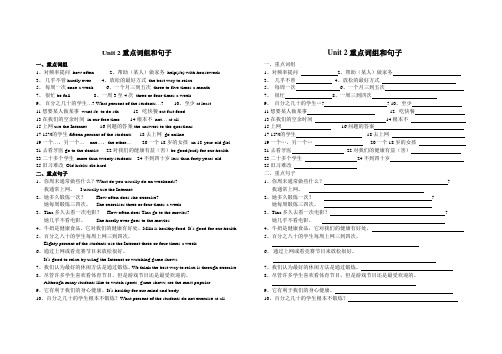
Unit 2重点词组和句子一、重点词组1、对频率提问how often2、帮助(某人)做家务help(sb) with housework3、几乎不曾hardly ever4、放松的最好方式the best way to relax5、每周一次once a week6、一个月三到五次three to five times a month7、很忙be full 8、一周3至4次three or four times a week9、百分之几十的学生…? What percent of the students…? 10、至少at least11.想要某人做某事want sb. to do sth. 12. 吃快餐eat fast food13.在我们的空余时间in our free time 14.根本不not… at all15.上网use the Internet 16.问题的答案the answers to the questions17.15%的学生fifteen percent of the students 18去上网go online19.一个…,另一个…one…,the other…20.一个18岁的女孩an 18-year-old girl 21.去看牙医go to the dentist 22.对我们的健康有益(害)be good(bad) for our health 23.二十多个学生more than twenty students 24.不到四十岁less than forty years old25.旧习难改Old habits die hard二、重点句子1、你周末通常做些什么?What do you usually do on weekends?我通常上网。
I usually use the Internet.2、她多久锻炼一次?How often does she exercise?她每周锻炼三四次。
Unit 2 How often do you exercise 知识点讲解

Unit2 How often do you exercise?1. 表示动作发生的“频率”的词有:(1)副词:every…, always, usually, often, sometimes, hardly, never 等。
(2)短语:即“次数+时间段”。
﹝注意“次数”的表达方法一次once,两次twice,三次或三次以上用基数词加上times:three times、five times、one hundred times.﹞once a week 一周一次twice a month 一月一次three times a year 一年三次2. how often 多久一次(询问的是动作发生的“频率”)How often do you surf the Internet?Twice a week你多久上一次网?一周两次。
3. as for意为“就……而论”,“至于”As for fruit,I eat it sometimes.至于水果,我有时吃它。
As for him,I never want to see him here.至于他,我永远不希望在这里见到。
4.My mother wants me to drink it.我妈妈想要我喝它。
want to do sth. 想要做某事want sb. to do sth. 想要某人干某事Do you want to go to the movies with me?你想和我一起去看电影吗?I want you to help me with my math.我想要你帮我学数学。
5.try to do sth 尽力去做某事try not to do sth 尽力不做某事= try/do one’s best to do sth. 尽某人最大努力做某事eg. We should try / do our best to help the people in trouble.我们该尽力帮助处于困境中的人们。
人教新目标八年级上册Unit2Howoftendoyouexercise知识点.doc

Unit 2 How often do you exercise?23.做某事的最好的方法___________________________ 24.看牙医____________________________ 25.超过,多余_________________ 26.健康的习惯________________ 27.别担心_________________ 28•旧习难改__________________________________29.频度副词的用法:(1).频度副词表示多长时间做某事一次,用在实义动词之前,系动词、助动词、情态动词之后,(2).对频度副词提问用how ofteno30.(1 )some time 一段时间,做时间状语■一how long(2)sometime adv在某个时候…when(3)some times 名词词组,“几次,几倍" ■一how many times⑷sometimes=at times有时 (一般现在时的标志词) …how often31.hard (l)adv努力地,猛烈地work hard努力工作study hard努力学习(2) adj.困难的,艰难的=difficult ♦Ifs hard/difficult for sb to do sth做某事对某人来说是困难的【特别提醒】hardly不是hard的副词形式,两者没有关系。
32.【拓展】how often/ how long / how far/ how soon 辨析33.次数的表达方法:once = one time —次twice= two times 两次三次或三次以上用:"基数词three times三次four times四次three or four times三到四次【注】:对次数提问用how many times。
help sb. (to) do sth =help sb. with sth.帮助某人做某事36.free ①adj.空闲的be free = have time有时间②adj.自由的,免费的be free to do sth.随心所欲的做某事37.full adj.忙的=busy adj.满的;充满的be full of = be filled with 充满3& least adv.最小,最少at least = not less than 至少;不少于39.health n 健康healthy adj 健康的(反[unhealthy40.although=though conj虽然,即使;不能与but连用,引导让步状语从句41.want sb. to do sth.= would like to do sth.想要某人做某事42.suchas “例如,像……一样”常常列举同类人或物中的几个例子,放在被列举的事物与前面的名词之间。
_Unit2_How_often_do_you_exercise?_知识点汇总加练习知识分享
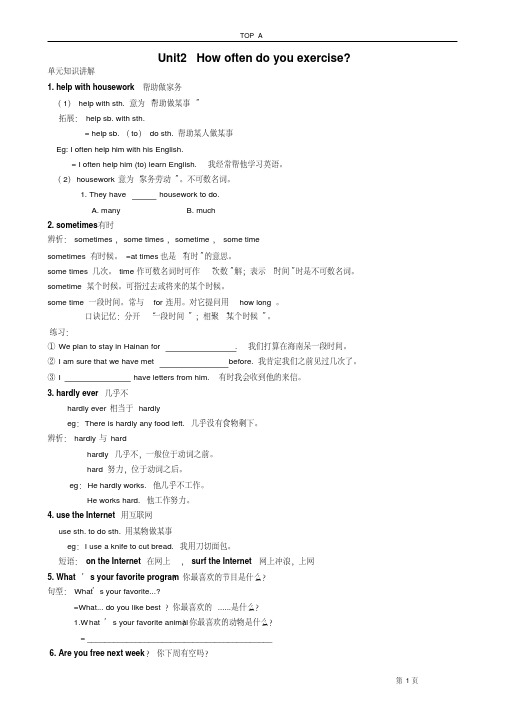
Unit2 How often do you exercise? 单元知识讲解1. help with housework 帮助做家务(1) help with sth. 意为“帮助做某事” 拓展:help sb. with sth.= help sb. (to) do sth. 帮助某人做某事Eg: I often help him with his English.= I often help him (to) learn English. 我经常帮他学习英语。
(2)housework 意为“家务劳动”。
不可数名词。
1. They have housework to do.A. manyB. much2. sometimes 有时辨析:sometimes ,some times ,sometime , some timesometimes 有时候。
=at times也是“有时”的意思。
some times 几次。
time作可数名词时可作“次数”解;表示“时间”时是不可数名词。
sometime 某个时候。
可指过去或将来的某个时候。
some time 一段时间。
常与for连用。
对它提问用how long 。
;相聚“某个时候”。
口诀记忆:分开“一段时间” 练习:① We plan to stay in Hainan for . 我们打算在海南呆一段时间。
② I am sure that we have met before. 我肯定我们之前见过几次了。
③ I have letters from him. 有时我会收到他的来信。
3. hardly ever 几乎不hardly ever相当于hardlyeg:There is hardly any food left. 几乎没有食物剩下。
辨析:hardly 与hardhardly 几乎不,一般位于动词之前。
hard 努力,位于动词之后。
eg:He hardly works. 他几乎不工作。
(完整word版)Unit2Howoftendoyouexercise知识点归纳与练习.doc
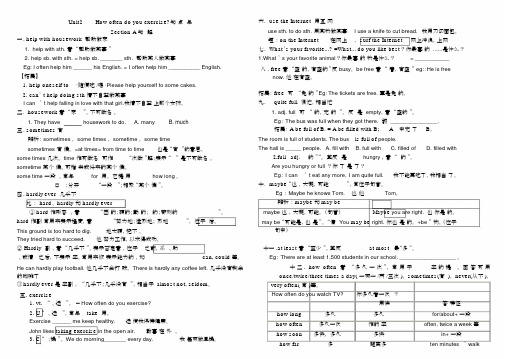
Unit2 How often do you exercise?知点与Section A 知解一. help with housework 帮助做家1.help with sth. 意“帮助做某事”2.help sb. with sth. = help sb. _______ sth. 帮助某人做某事Eg: I often help him ______ his English. = I often help him __________ English.【拓展】1.help oneself to ⋯随便吃 /喝·Please help yourself to some cakes.2.can’ t help doing sth情不自禁做某事I can’ t help falling in love with that girl.我情不自禁上那个女孩。
二. housework 意“家”。
不可数名。
1. They have housework to do. A. many B. much三. sometimes 有辨析: sometimes , some times , sometime , some timesometimes 有候。
=at times= from time to time也是“有”的意思。
some times 几次。
time 作可数名可作“次数”解;表示“ ” 是不可数名。
sometime 某个候。
可指去或将来的某个候。
some time 一段。
常与for 用。
它提用how long 。
口:分开“一段”;相聚“某个候”。
四. hardly ever 几乎不比: hard、 hardly 和 hardly ever① hard 作形容,意“困的;硬的;勤的;的;苛刻的”。
hard 作副常用来表示程度,意“努力地;猛烈地;烈地”,位于后。
This ground is too hard to dig.地太硬,挖不。
Unit2-how-often-do-you-exercise知识点讲解和练习

Unit2 how often do you exercise一、同步知识梳理重点单词1.家务事2.几乎不3.曾经4.一次5.两次6.因特网7. 节目8.满的)9.秋千 10.大概 11.最小12.咖啡13.健康 14.结果 15.百分之..16.在线17.电视节目 18.即使 19.穿过20.头脑21.身体 22.这样的 23.在一起24.死亡25.作家 26.牙科医生 27.杂志28.然而29.比 30.几乎 31.毫无32.较小 33.得分?重点词组1.2.几乎不 2.摇摆舞3.至少4.垃圾食品5.例如6.多于7.少于重点句型1.What do you usually do on weekends;I always exercise.2.What does she do on weekendsShe sometimes goes shopping.3.How often do you you go to the moviesI go to movies maybe once a month.Section Aoften do you exercise 你多久做一次运动—【解析1】how often/ how long / how far/ how soon辨析》【解析2】exercise v 锻炼=do sports= play sports【短语】take /have/do exercise 做运动 do morning exercise 做早操 do eye exercise 做眼保健操2.3.What do you usually do on weekends 你在周末做什么【解析1】频度副词【注】:频度副词表示多长时间做某事一次, 用在实义动词之前,系动词、助动词、情态动词之后。
We often clean the classroom every day. 【拓展】some time /sometime/some times/sometimes 【口诀】:分开是一段,合起是某时; 分开s 是倍次,合起s 是某时 (1)some time 一段时间,做时间状语 ;It takes sb. some time to do sth. 做某事花费某人多长时间(2)(3)sometime adv. 在某个时候,I hope to visit the USA _____ in the future.A. sometimesB. some timesC. sometime D . some time(3) some times 名词词组,“几次,几倍” sometimes=at times 有时 (一般现在时的标志词) 【解析2】weekend/weekday 辨析 【解析】on weekends = on Saturday and Sunday 在周末on weekdays= from Monday to Friday 在工作日3. Hardly ever 几乎从不【解析】hard (1)adv 努力地,猛烈地work hard 努力工作study hard 努力学习:(2) adj. 困难的,艰难的=difficult◆It’s hard/difficult for sb. to do sth. 做某事对某人来说是困难的It’s hard for us ____________(finish) the work without other ’s help.【拓展】hardly adv “几乎不,从来不”,表否定意义,常与can ,any ,ever 连用。
初二英语上册Unit 2 How often do you exercise_知识点总结-人教新目标版
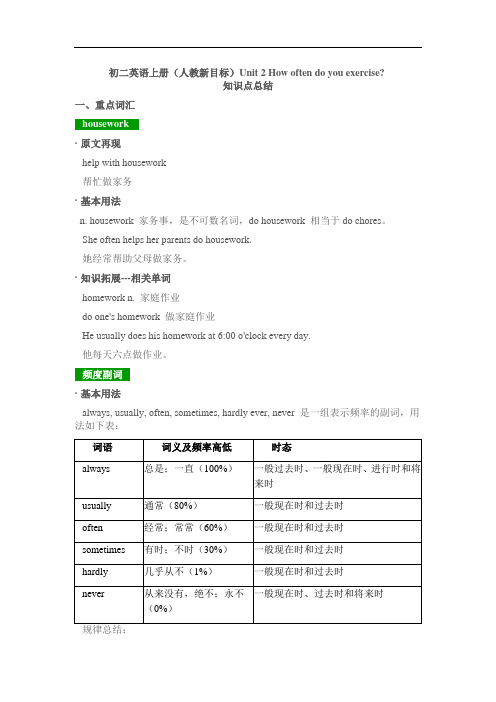
初二英语上册(人教新目标)Unit 2 How often do you exercise?知识点总结一、重点词汇·原文再现help with housework帮忙做家务·基本用法n. housework 家务事,是不可数名词,do housework 相当于do chores。
She often helps her parents do housework.她经常帮助父母做家务。
·知识拓展---相关单词homework n. 家庭作业do one's homework 做家庭作业He usually does his homework at 6:00 o'clock every day.他每天六点做作业。
·基本用法always, usually, often, sometimes, hardly ever, never 是一组表示频率的副词,用法如下表:1. 这些副词在句子中的位置基本相同,一般放在助动词、be动词或情态动词之后,行为动词之前。
2. hardly和never均为否定副词,有二者的句子不需再加no或not构成否定,因其本身就是否定句。
3. 就这些表示拼读的副词提问时,常用how often。
·知识拓展---词义辨析hard/hardly1. hard可充当形容词和副词两种角色。
(1)用作形容词有“硬的”,“困难的、艰难的”的意思。
其中用作“难的”讲时,在口语中与difficult通用。
The problem is too hard, I can't work it out.这个问题太难了,我算不出来。
(2)用作副词,意为“努力地、刻苦地”,“猛烈地”,hard用作“猛烈地”讲时,同heavily相同。
He works hard only before exams.他只在考试前努力学习。
It is raining hard outside. You can't go out.外面正下着大雨。
人教版八年级上册英语Unit2How often do you exercise知识点
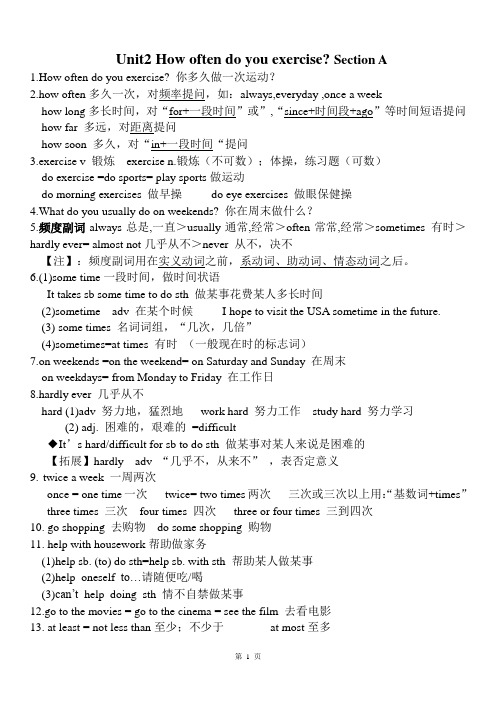
Unit2 How often do you exercise? Section A1.How often do you exercise? 你多久做一次运动?2.how often多久一次,对频率提问,如:always,everyday ,once a weekhow long多长时间,对“for+一段时间”或”,“since+时间段+ago”等时间短语提问how far 多远,对距离提问how soon 多久,对“in+一段时间“提问3.exercise v 锻炼exercise n.锻炼(不可数);体操,练习题(可数)do exercise =do sports= play sports做运动do morning exercises 做早操do eye exercises 做眼保健操4.What do you usually do on weekends? 你在周末做什么?5.频度副词always总是,一直>usually通常,经常>often常常,经常>sometimes 有时>hardly ever= almost not几乎从不>never 从不,决不【注】:频度副词用在实义动词之前,系动词、助动词、情态动词之后。
6.(1)some time一段时间,做时间状语It takes sb some time to do sth 做某事花费某人多长时间(2)sometime adv 在某个时候I hope to visit the USA sometime in the future.(3) some times 名词词组,“几次,几倍”(4)sometimes=at times 有时(一般现在时的标志词)7.on weekends =on the weekend= on Saturday and Sunday 在周末on weekdays= from Monday to Friday 在工作日8.hardly ever 几乎从不hard (1)adv 努力地,猛烈地work hard 努力工作study hard 努力学习(2) adj. 困难的,艰难的=difficult◆It’s hard/difficult for sb to do sth 做某事对某人来说是困难的【拓展】hardly adv “几乎不,从来不”,表否定意义9.twice a week 一周两次once = one time一次twice= two times两次三次或三次以上用:“基数词+times”three times 三次four times 四次three or four times 三到四次10.go shopping 去购物do some shopping 购物11.help with housework帮助做家务(1)help sb. (to) do sth=help sb. with sth 帮助某人做某事(2)help oneself to…请随便吃/喝(3)can’t help doing sth 情不自禁做某事12.go to the movies = go to the cinema = see the film 去看电影13. at least = not less than至少;不少于at most至多14. use the Internet 上网15.What’s your favorite program?=What program do you like best?你最喜欢的节目是什么?16.every day 每天= each day 做状语,放在句末,对其提问用how ofteneveryday = daily adj. 每天的,作定语,修饰名词,放在名词之前He exercises every day. 他每天都锻炼。
Unit_2How_often_do_you_exercise_知识点总结

❖ 答语:(1)every+名词单数
❖ everymorning/afternoon/evening/day/Sunda y/weekend/week/ month/term/year/…
(2)次数+一段时间
once a day;twice a week;once or twice a year;two or three times
26.对…有益/有害 be good/bad for
27.帮助某人做某事 help sb. (to)do sth. 28.放学回家 come home from school 29.去看电影 go to the movies 30.在周末 on weekends/over the Байду номын сангаасeekend
二、知识点
❖ 15.高中
high/Senior school
❖ 16. …的结果 the result(s)of ……
❖ 17.与…相同 be the same as
❖ 18.与…不同 be different from
❖ 19.保持某物呈某种状态keep sth.+adj.
❖ 20.一个健康的生活方式a healthy lifestyle
❖8.至于,关于 as for
❖9.垃圾食品 junk food
❖10.保持健康 keep/stay healthy
❖ 11.饮食习惯 eating habits
❖ 12.尽力做某事 try to do sth.
❖ 13.两三次 two or three times
❖ 14.上网
surf the Internet
unit2-How-often-do-you-exercise复习知识点

Unit2 how do you often exerciseSection A1. on weekends在周末weekend指星期六和星期天weekday工作日2. help with housework 帮忙做家务help (sb) with sth帮(某人)做某事,with后用名词【拓展】1) help sb (to) do sth 帮助某人做某事2) help (to) do sth 帮忙做某事3) help onese lf to… 请随便吃/喝···Please help yourself to some cakes. 请随便吃一些蛋糕吧。
4)can’t help doing sth 情不自禁做某事I can’t help falling in love with that girl. 我情不自禁爱上那个女孩。
3.【拓展】(1)这些副词在句子中的位置基本相同,一般放在助动词、be动词或情态动词之后,行为动词之前。
即:“行”前“助(系)”后。
Peter is always late for school. Peter上学总是迟到。
(2)hard、hardly和hardly everHe can hardly play football. 他几乎不会打篮球。
4、exercise (1)作不及物动词,意为“锻炼、运动”。
— How often do you exercise? 你多久锻炼一次?— I exercise every day. 我每天都锻炼。
(2)作不可数名词,意为“锻炼、运动”,常与动词take连用。
Exercise makes me keep healthy. 运动使我保持健康。
John likes take exercise in the open air. 约翰喜欢在户外锻炼。
(3)作可数名词,意为“练习;操”。
We do morning exercises every day. 我们每天做早操。
Unit2 How often do you exercise 知识点总结

Unit2 How often do you exercise? 知识点总结一、单词和短语1.How often......? 多久一次?How often 常对every day,always,usually,often,sometimes,hardly ever,never,once a week,twice 等表示频度副词或短语进行提问。
2.help v./n. 帮助A.作动词,相关短语:①.help sb. with sth. 在某方面帮助某人②. help sb. (to) do sth. 帮助某人做某事③. help oneself to sth. 请自便④.can’t help doing sth. 情不自禁做某事Eg. My brother helps me with my English. = My brother helps me learn English.我的弟弟帮我学习英语。
He can’t help crying when watching the love movie. 他看这个爱情电影时情不自禁哭了。
Please help yourself to the drinks. 请自取饮料酒水。
3.4.5.频度副词频率排序:always>almost always>usually>often>sometimes>seldom>hardly ever>almost never>never6.once 副词,一次;曾经;一旦A.作副词,意为“一次”,表示频率,常用来回答how often的提问。
Eg. —How often do you go shopping? —Once a week.B.作副词,意为“曾经”,表时间,常与一般过去时连用。
Eg. He once lived in Beijing,China. 他曾经住在中国北京。
howoftendoyouexercise知识点归纳
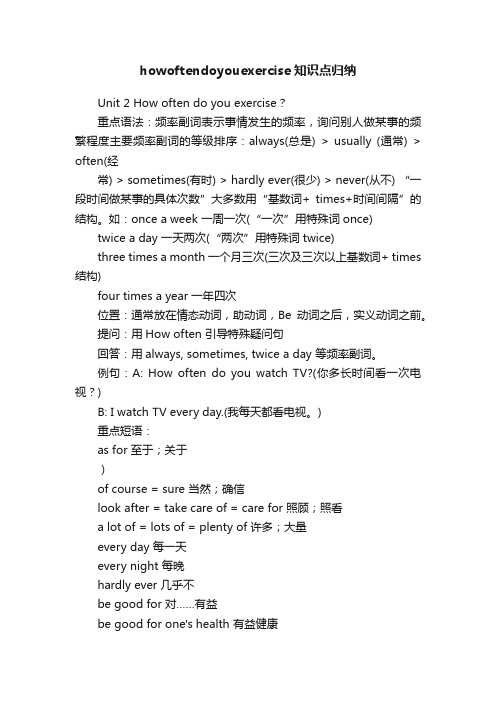
howoftendoyouexercise知识点归纳Unit 2 How often do you exercise?重点语法:频率副词表示事情发生的频率,询问别人做某事的频繁程度主要频率副词的等级排序:always(总是) > usually (通常) > often(经常) > sometimes(有时) > hardly ever(很少) > never(从不) “一段时间做某事的具体次数”大多数用“基数词+ times+时间间隔”的结构。
如:once a week 一周一次(“一次”用特殊词once) twice a day 一天两次(“两次”用特殊词twice)three times a month 一个月三次(三次及三次以上基数词+ times 结构)four times a year 一年四次位置:通常放在情态动词,助动词,Be动词之后,实义动词之前。
提问:用How often 引导特殊疑问句回答:用always, sometimes, twice a day 等频率副词。
例句:A: How often do you watch TV?(你多长时间看一次电视?)B: I watch TV every day.(我每天都看电视。
)重点短语:as for 至于;关于)of course = sure 当然;确信look after = take care of = care for 照顾;照看a lot of = lots of = plenty of 许多;大量every day 每一天every night 每晚hardly ever 几乎不be good for 对……有益be good for one's health 有益健康try to do sth. 尝试做某事get good grades 取得好成绩help sb. [to] do sth. 帮助某人做某事kind of 有点want [sb.] to do sth. 想要(某人)做某事keep in good health 保持健康No two men think alike. 人心各异。
人教版八年级上册英语知识点梳理Unit 2 How often do you exercise
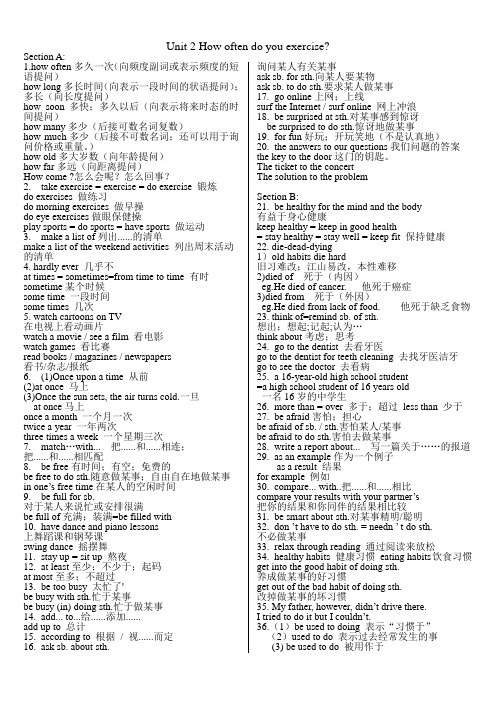
Unit 2 How often do you exercise?Section A:1.how often多久一次(向频度副词或表示频度的短语提问)how long多长时间(向表示一段时间的状语提问);多长(向长度提问)how soon多快;多久以后(向表示将来时态的时间提问)how many多少(后接可数名词复数)how much多少(后接不可数名词;还可以用于询问价格或重量。
)how old多大岁数(向年龄提问)how far多远(向距离提问)How come ?怎么会呢?怎么回事?2. take exercise = exercise = do exercise 锻炼do exercises 做练习do morning exercises 做早操do eye exercises做眼保健操play sports = do sports = have sports 做运动3. make a list of列出......的清单make a list of the weekend activities 列出周末活动的清单4. hardly ever 几乎不at times = sometimes=from time to time 有时sometime某个时候some time 一段时间some times 几次5. watch cartoons on TV在电视上看动画片watch a movie / see a film 看电影watch games 看比赛read books / magazines / newspapers看书/杂志/报纸6. (1)Once upon a time 从前(2)at once 马上(3)Once the sun sets, the air turns cold.一旦at once马上once a month 一个月一次twice a year 一年两次three times a week 一个星期三次7. match…with... 把......和......相连;把......和......相匹配8. be free有时间;有空;免费的be free to do sth.随意做某事;自由自在地做某事in one’s free time在某人的空闲时间9. be full for sb.对于某人来说忙或安排很满be full of充满;装满=be filled with10. have dance and piano lessons上舞蹈课和钢琴课swing dance 摇摆舞11. stay up = sit up 熬夜12. at least至少;不少于;起码at most至多;不超过13. be too busy 太忙了'be busy with sth.忙于某事be busy (in) doing sth.忙于做某事14. add... to...给......添加......add up to 总计15. according to 根据/ 视......而定16. ask sb. about sth. 询问某人有关某事ask sb. for sth.向某人要某物ask sb. to do sth.要求某人做某事17. go online上网;上线surf the Internet / surf online 网上冲浪18. be surprised at sth.对某事感到惊讶be surprised to do sth.惊讶地做某事19. for fun好玩;开玩笑地(不是认真地)20. the answers to our questions我们问题的答案the key to the door这门的钥匙。
Unit 2 How often do you exercise 知识点精讲

Unit 2 How often do you exercise?一、构词法1.名词加y构成形容词。
sun(太阳)→sunny (阳光灿烂的)rain(雨水)→rainy (多雨的)wind(风)→windy (多风的,风大的)cloud(云)→cloudy (多云的,阴天的)snow(雪)→snowy (多雪的)sun(太阳)→sunny (多阳光的,明朗的)luck(运气)→lucky (幸运的)noise(嘈杂声)→noisy (嘈杂的,喧闹的)health(健康)→healthy (健康的)2.名词加-ful构成形容词。
use(使用)→useful (有用的,有益的。
不去e)awe (敬畏) →awful(使人敬畏的讨厌的,可怕的。
去掉e)beauty (美丽)→beautiful (美丽的)[特别提醒:别忘了把-y变成-i,再加-ful]care (关心,小心)→careful (小心的,仔细的)3.名词加-ly构成形容词。
friend (朋友)→friendly (友好的)love (爱)→lovely (可爱的)month (月份)→monthly (每月的)live (生活,居住)→lively (充满生气的)day (天)→daily (每日的)4.动词加ing构成形容词:relax放松—relaxing令人愉快的bore令人厌恶—boring令人厌恶的interest吸引—interesting令人感兴趣的5.动词加ed构成形容词:crowd拥挤—crowded 拥挤的relax轻松—relaxed轻松的舒畅的interest吸引—interested感兴趣的bore很厌恶—bored疲倦的二、短语归纳①help with housework 帮助做家务活②go shopping 购物③on weekends 在周末④how often 多久一次⑤hardly ever几乎不⑥once a week 每周一次⑦twice a month每月二次⑧go to the movies去看电影⑨every day 每天⑩use the Internet上网/用网11 be free有空12 have dance and piano lessons 上舞蹈钢琴课13 swing dance摇摆舞14 play tennis 打网球15 stay up late 熬夜16 at least至少17 go to bed early 早睡18 play sports 锻炼身体19 be good for 对…有好处20 go camping去野营21 in one’s free time 在某人的空闲时间22 not….at all 根本不23 the most popular 最流行24 such as例如25 go to the dentist去看牙医26 more than 超过/多于27 Old habits die hard.旧习惯难改28 hard=difficult 困难的29 less than 少于/不到三、典句必背①—What do you usually do on weekends? 你周末通常做什么?—I always exercise.总是锻炼身体。
UNIT 2 How often do you exercise 知识点
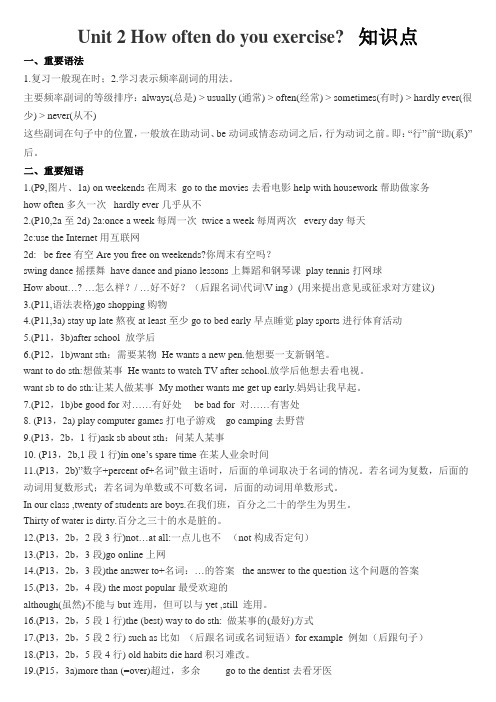
Unit 2 How often do you exercise? 知识点一、重要语法1.复习一般现在时;2.学习表示频率副词的用法。
主要频率副词的等级排序:always(总是) > usually (通常) > often(经常) > sometimes(有时) > hardly ever(很少) > never(从不)这些副词在句子中的位置,一般放在助动词、be动词或情态动词之后,行为动词之前。
即:“行”前“助(系)”后。
二、重要短语1.(P9,图片、1a) on weekends在周末go to the movies去看电影help with housework帮助做家务how often多久一次hardly ever几乎从不2.(P10,2a至2d) 2a:once a week每周一次twice a week每周两次every day每天2c:use the Internet用互联网2d: be free有空Are you free on weekends?你周末有空吗?swing dance摇摆舞have dance and piano lessons上舞蹈和钢琴课play tennis打网球How about…? …怎么样?/ …好不好?(后跟名词\代词\V ing)(用来提出意见或征求对方建议)3.(P11,语法表格)go shopping购物4.(P11,3a) stay up late熬夜at least至少go to bed early早点睡觉play sports进行体育活动5.(P11,3b)after school 放学后6.(P12,1b)want sth:需要某物He wants a new pen.他想要一支新钢笔。
want to do sth:想做某事He wants to watch TV after school.放学后他想去看电视。
Unit 2 How often do you exercise基础知识

Unit 2 How often do you exercise?how long意为“多久、多长时间”,主要是对一段时间进行提问,答语通常是(for)three days/weeks/months等时间段,它可用于各种时态.How long do you stay in Beijing every year?每年你在北京住多久?How long have they lived here?他们住在这里有多久了?—How long were you not at school last year?去年你多久没上学?—About two weeks.约两周.how soon意为“还要多久”,是对从某个基本时间到将来某动作结束或某动作发生这段时间提问,常用在一般将来时态的句子中,其答语通常是“in + 一段时间”.—How soon can you finish the work?还要多久你能完成这项工作?—In half an hour.半小时后.选择填空.1.—_______ did the meeting last?—About half an hour.A.How soonB.How longC.How farD.How much2.—_______ will Ezhou-Huanggang Bridge be finished?—In a few months.A.How soonB.How longC.How oftenD.How far3.—________ will it take you to get to the post office?—About half an hour.A.How oldB.How longC.How soonD.How often4.—_________ do you write to your mother?—Once a month.A.How many timesB.What time is itC.How soonD.How often5.—_______ a year does your school have sports meetings?—Twice a year.A.How oftenB.How soonC.How longD.How many times_______________________________________________答案:1.B 2.A 3.B 4.D 5.A2、help with houseworkhelp with sth. “帮忙做某事”= help sb. (to) do sth. “帮助某人做某事”ask sb. to do sth.叫某人做某事tell sb. to do sth.告诉某人去做某事3、Exercise1).作不及物动词,译为“运动,锻炼”。
八年级上册英语Unit_2_How_often_do_you_exercise知识点总结
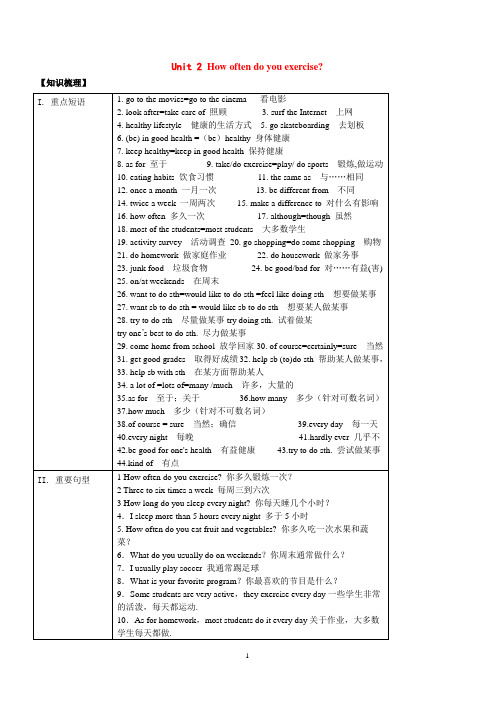
Unit 2 How often do you exercise? 【知识梳理】III. 交际用语询问别人做某事的频繁程度IV. 重要语法频率副词一For about three years.大约三年.(2)how soon意为“多久以后”.多用于将来时间,其答语为in+一段时间.—How soon will your mother come back?你妈妈多久以后回来?一She will be back in ten minutes.她十分钟以后回来.(3)how many times意为“多少次”,它只询问次数,即“多少次”.常用once一次,twice两次,three times三次等回答.一How many times did you get to Beijing?你去北京几次了?—Oh,four times.哦,四次了.(4)how far意为“离……多远”,多用来询问路程.How far is it from your school to your home?你家距离学校有多远?【易混辨析】house, family ,home(1)house一般指所居住的建筑物,即“房子,住宅”.His house was burned in a big fire.他的房子在一场大火中被烧毁了.(2)family着重指家庭成员.My family are au here.我们一家都在这儿.(3)home则指某人出生及生活的环境,包括住处及家人.He left home at the age of 18.他18岁离开了家.4.trytry to do sth.试图做某事,想要做某事try one's best竭尽所能She tries to learn English.她试着去学英语.Jack tries his best to win the game.杰克尽他最大的努力去赢这场比赛.5. a lot of, many, much三者都可表示“许多”,a 10t 0f既可修饰可数名词,也可修饰不可数名词;many修饰可数名词复数;much 修饰不可数名词.We have a lot of friends.---We have many friends.我们有许多朋友.Do you have a lot of money?=Do you have much money?你有许多钱吗?在修饰可数名词复数时,a lot/lots of可与many互换;在修饰不可数名词时,alot/lots of可与much互换.但a lot/lots of一般不用于否定句和疑问句中,在这两类句子中要用many或much.6.kind ofkind of后接形容词或副词,意为“有点,有几分”.He felt kind of tired.他感觉有点累.The like is kind of expensive.那辆自行车有点贵.(1)a kind of+ m一种This kind of question is hard to answer.这种问题很难回答.(2)all kinds《+n.各种各样的There are all kinds of flowers iIl the park.公园里有各种各样的花.(3)different kinds of+n.不同种类的There a地different kinds of animals in the zoo.动物园里有不同种类的动物.7.Maybe ,perhaps, likely possible, probablymaybe. perhaps和probably都有“也许,大概”的意思.perhaps也许,大体和possibly同义;probably大概,肯定的成分较大,是most likely的意思;possibly可能,常和call,may,must等情态动词连用,比probably语气弱得多;maybe或许,比perhaps普通,但不庄重;likely或许,通常与most,very连用.8.although , thoughalthough和though作连词用,意为“尽管,虽然”,二者可以通用.Although/Though they are so poor ,they have enough to eat·他们虽然穷,食物还是够吃的.注意:在一个句子中,用了although或though就不能用but了,用了but则不能用although或though,即:“虽然……但是……”不见面,但是可以用yet.9.hard, hardlyhard既可作形容词,也可作副词,其词义丰富;hardly是具有“几乎没有,几乎不”这种否定含义的独立副词. ms ground is too bard to dig.这块地太硬,挖不动.(adj.)Chinese is hard t0 learn for foreigners.对于外国人来说汉语很难学.(adj.)You should study hard.你应该努力学习.(adv.)There is hardly any coffee left.几乎没剩下什么咖啡了.(adv.)Hardly anybody came.几乎没有什么人来. (adv.)【中考连线】①一Do you have any plans for your summer vacation?一I am ____for London next Sunday.A.going to B.leaving C. will go答案:B点拨:leave for意为“动身去某地”,故选B.②(2009·浙江湖州中考)---___do you visit your uncle?----Once a week, at least.A.How long B.How manyC.How often D .How soon答案:C点拨:本题考查疑问词的用法.由答语“至少一周一次”可知用how often how long “多久”;how m any'‘多少”;how soon'‘多久”.③(2009·淄博中考)--Would you mind ____my little sister while I’II away?--Of course not.A.looking for B. looking atC. looking afterD. looking forward to答案:C点拨:由题意“当我不在时,你介意照顾一下我妹妹吗?”知选looking after.④《2009·河北中考)--___can you be ready ,Andy?一In ten minutes. .A.How much B.How oftenC.How long D .How soon答案:D点拨:how much多少.提问不可数名词或价格;How often多久一次;how long多久,多长;how soon多久,用于将来时态.由答语in ten minutes“在l0分钟之后”知选D.1. How often do you shop? 疑问词how的用法(1)怎样,用什么手段,方法/交通工具How are you? / How is she?How did he do it? / I don’t know how to swim.How do you come to school?(2) 情况如何(指身体健康状况)How are you?(3) how many,how much表示“多少”how many后接可数名词复数,how much接不可数名词。
- 1、下载文档前请自行甄别文档内容的完整性,平台不提供额外的编辑、内容补充、找答案等附加服务。
- 2、"仅部分预览"的文档,不可在线预览部分如存在完整性等问题,可反馈申请退款(可完整预览的文档不适用该条件!)。
- 3、如文档侵犯您的权益,请联系客服反馈,我们会尽快为您处理(人工客服工作时间:9:00-18:30)。
Unit2 How often do you exercise?知点与Section A 知解一. help with housework 帮助做家1.help with sth. 意“帮助做某事”2.help sb. with sth. = help sb. _______ sth. 帮助某人做某事Eg: I often help him ______ his English. = I often help him __________ English.【拓展】1.help oneself to ⋯随便吃 /喝·Please help yourself to some cakes.2.can’ t help doing sth情不自禁做某事I can’ t help falling in love with that girl.我情不自禁上那个女孩。
二. housework 意“家”。
不可数名。
1. They have housework to do. A. many B. much三. sometimes 有辨析: sometimes , some times , sometime , some timesometimes 有候。
=at times= from time to time也是“有”的意思。
some times 几次。
time 作可数名可作“次数”解;表示“ ” 是不可数名。
sometime 某个候。
可指去或将来的某个候。
some time 一段。
常与for 用。
它提用how long 。
口:分开“一段”;相聚“某个候”。
四. hardly ever 几乎不比: hard、 hardly 和 hardly ever① hard 作形容,意“困的;硬的;勤的;的;苛刻的”。
hard 作副常用来表示程度,意“努力地;猛烈地;烈地”,位于后。
This ground is too hard to dig.地太硬,挖不。
They tried hard to succeed.他努力工作,以求得成功。
② Hardly副,意“几乎不”,表示否定意,位于之前,系、助、或情之后,不表示率。
常用来修表示能力的,如can, could 等。
He can hardly play football. 他几乎不会打球。
There is hardly any coffee left. 几乎没有剩余的咖啡了③hardly ever 是率副,“几乎不;几乎没有”,相当于 almost not, seldom。
五. exercise1.vt. “ 、运”。
—How often do you exercise?2.U “ 、运”,常与 take 用。
Exercise ______ me keep healthy.运使我保持健康。
John likes taking exercise in the open air.翰喜在外。
3. C “ ;操”。
We do morning_______ every day.我每天做早操。
六. use the Internet 用互网use sth. to do sth. 用某物做某事I use a knife to cut bread.我用刀切面包。
短: on the Internet在网上,surf the Internet网上冲浪,上网七. What’s your favorite...? =What... do you like best?你最喜的......是什么?1.What ’ s your favorite animal?你最喜的物是什么?= ___________八 . free 意“空的,有空的”反busy。
be free意“ 着,有空” eg::He is freenow. 他在有空。
拓展: free 可“免的”Eg:The tickets are free.票是免的。
九.quite full 很忙,相当忙.1.adj. full 可“ 的,充的”。
反是 empty,意“空的”。
Eg: The bus was full when they got there. 翻 _______________.拓展: A be full of B. = A be filled with B; A中充了B。
The room is full of students. The bus is full of people.The hall is _____ people. A. fill with B. full with C. filled of D. filled with2.full adj.的”“。
其反是hungry ,意“ 的”。
Are you hungry or full ?你了是了?Eg: I can’ t eat any more,I am quite full.我不能再吃了,我相当了。
十. maybe “也,大概,可能”,常位于句首。
Eg : Maybe he knows Tom.也他Tom。
辨析: maybe 和 may bemaybe 也,大概,可能。
(句首)Maybe you are right.也你是的。
may be “可能是,也是”。
“情You may be right.你也是的。
+be ” 构。
(位于句中)十一 .at least 意“至少”。
其反at most最“多”。
Eg: There are at least 1,500 students in our school. __________________ 。
十二 . how often 意“多久一次”,常用于率的提。
回答可用once/twice/three times a day( 一天一 /两 /三次 ), sometimes(有 ), never(从不 ),very often(常 )等。
How often do you watch TV? 你多久看一次?用法答特征how long 多久多久for/about+ 一段how often 多久一次作的率often, twice a week 等how soon 多快,多久多快in+ 一段how far 多距离多ten minutes ’ walkhow many 多少Cn 数量数 +Cn 复数多少Un 数量数 +表示量的 +Un how much价格数 +多少十三 . look、 see、 watch 和 read 辨析:look 不及物,后接用介at,指看的作。
see着重于看的后果,即“看到,看”。
read 多指“看、”,里的“看” “ ”。
watch 表示“注,看,”之意。
也常用于“看,看比”等短中Section B一.want sb. to do sth. 的否定形式want sb. _____to do sth.Eg:She wants me to bring him some pens. 否定: She wants me___ him some pens.1.want sth. 想要某物2.want to do sth. 想要做某事3. want (sb.)to do sth.=would like/love (sb.)to do sth.二.be good for 意“ ⋯⋯有益”。
反be bad for“⋯⋯ 有害”。
Eg: Vegetables are good for you. 蔬菜你有好。
【拓展】 1.be good to “ ⋯好”,其反短be bad to “ ⋯不好”。
2. be good at 在“方面擅⋯ ”, at 后面常接名、代或-ing 形式,同短do well in。
She is good at English and Chinese. = She does well in English and Chinese. 她擅英和。
I am good at _______ ( play) basketball.3.be good with 和⋯“相得好;擅于和⋯相”。
Are you good with children?你和孩子相得好?三. 1. health n. 健康,C,意“健康 (状况 ) ”,常用于“be in good(poor/bad)health 短中,表示“身体好 ( 不好 ) ”。
My grandparents are both in good health.我祖父母身体都很好。
2.healthy adj. 健康的 unhealthy adj.不健康的四. ask sb. about sth. “某人关于某事”Eg:I asked my teacher about today’ s homework.五. Here are the results. 是()果。
here 位于句首,句子要倒装。
Here is + 数名。
Here are + 复数名 .Eg: Here is your jacket.是你的克。
六. find ++名 ,:We have found him (to be) a good boy.find ++ 形容,:He found the room dirty.七 . 1. 百分数由percent 表示,基数+percent ,常用“数+percent of+名”一构作主,的复数要看percent of 后跟的名,如果是可数名复数,用复数,如果是不可数名,用数Thirty percent of thestudents ______ ( like) watching game shows.70 percent of water _______ ( be ) salty water( 水 )。
八. not... at all一点“儿也不,根本不”, not和be、助或情用。
Eg : I don’ t know about it at all.那件事我一点也不知道。
The story isn’ t interestingatall.The old man can’ t use the computer at all.拓展: not at all = you are welcome 意“不用,不客气”。
Eg : --Thank you for your help. --Not at all.九. surprised惊奇的,感到意外的1. be surprised at sb. / sth. / doing sth. ⋯感到惊奇We are surprised at the news.2. be surprised to do sth. 做某事感到惊I’m very surprised to meet you here.3. be surprised that + 从句 . 因⋯感到惊I’m surprised that he came here on time. 【拓展】surprising 令人惊的to one ’s surprise令某人惊的是in surprise 惊地;吃惊地十. the answers to questions 的答案the way to sp去某地的路十一 . most students = most of the students大多数学生1.most +复数名 . Most birds can fly.大多数儿会. ________大部分2.most of + 限定 +复数名most of the girls , most of my friends3. most of + 人称代格most of them / us______ the students like reading the story. A. Most B. Most of4. the +most +多音形容,表示最高,意“最”。
